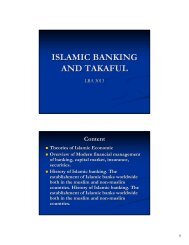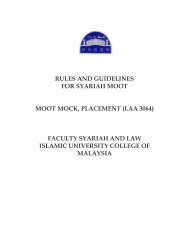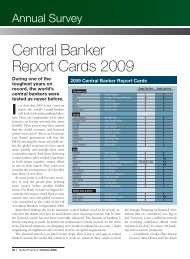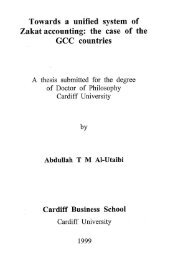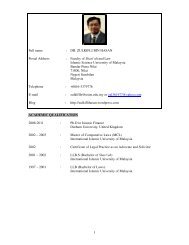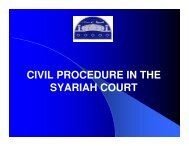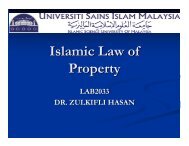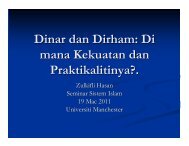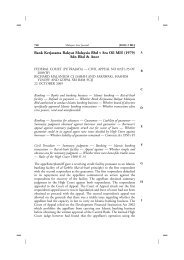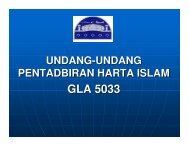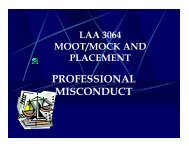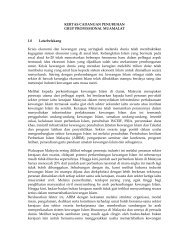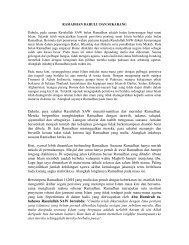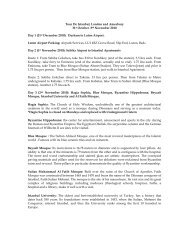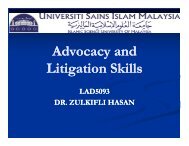Cheque
Cheque
Cheque
You also want an ePaper? Increase the reach of your titles
YUMPU automatically turns print PDFs into web optimized ePapers that Google loves.
Law of Banking and<br />
Security<br />
DR. ZULKIFLI HASAN<br />
25th October 2011<br />
Week VII
Contents<br />
Holder of a <strong>Cheque</strong><br />
Defences to a Claim on <strong>Cheque</strong><br />
Collection of <strong>Cheque</strong>s<br />
Collecting Bankers<br />
Paying Bankers
Holder of a cheque<br />
Section 2 defines what is a holder<br />
Payee<br />
Indorsee who is in possession of it/bearer<br />
Possessor of a cheque is not necessarily the<br />
holder.
Rights of Holder of a <strong>Cheque</strong><br />
1. Special Indorsement<br />
2. Crossing a cheque<br />
3. Duplication of <strong>Cheque</strong><br />
4. presentation<br />
5. Negotiation<br />
6. Notice of dishonour<br />
7. Right of action
Holder in Due Course<br />
A person to whom a bill has been negotiated.<br />
HIDC may get a better title than the person from whom he<br />
took.<br />
S 29- Requirement:-<br />
1. He must be a holder<br />
2. Complete and regular<br />
3. Before overdue<br />
4. No notice of dishonour- Normally dishonoured cheque has<br />
some answer written on it.<br />
5. For value- debt or liability<br />
6. Must be negotiated- the original payee cannot be a HIDC.<br />
7. In good faith<br />
8. No notice of defective title
Defence to a claim on cheque<br />
Consideration- necessary for enforceability of<br />
contract.<br />
A promisee who sues on an oral undertaking of<br />
another person/ written undertaking, will be<br />
unable to enforce, unless he gave consideration<br />
Quid pro quo- in return for the promise<br />
An act/forbearance on the part of the promisee
Defences<br />
1. No notice of dishonour: Must be given within a<br />
reasonable time.<br />
<br />
<br />
Reside in the same place: on the day after the<br />
dishonour<br />
In different places: on the day after the dishonour or a<br />
post at a convenient hour on that day or the next day<br />
post thereafter<br />
2. Defendant’s s contractual incapacity- minority and<br />
mental incapacity<br />
3. <strong>Cheque</strong> incomplete when signed<br />
4. <strong>Cheque</strong> delivered upon a condition- Section<br />
21(2)(b)<br />
5. Forged signature
Forged Signature<br />
Forged signature: Section 24- differences<br />
between forged signature and unauthorised<br />
signature<br />
Forgery: The act of making false document in<br />
order that it may pass of be used as genuine.<br />
Effect:<br />
1. the forged or unauthorised signature is<br />
wholly inoperative<br />
2. no right to retain the cheque<br />
3. no right to enforce payment<br />
Robinson v Midland Bank [1925] 41 TLR 170-<br />
unauthorised signature will amount to forgery
Duty to Prevent Fraud<br />
Greenwood v Martins Bank Ltd [1933] AC 51<br />
A husband had discovered that his wife had<br />
forged his signature as drawer to several<br />
cheques on his account with the DT. He did<br />
not immediately inform the bank. He decided<br />
to do so at a later date when discovered that<br />
his wife had been untruthful.<br />
The H was under duty to inform the bank.<br />
The operation of the legal doctrine of<br />
estoppel.
Duty to Prevent Fraud<br />
Public Bank Bhd v Anuar Hong & Ong [2005] 1 CLJ 289<br />
The Pt, a legal firm-2 2 accounts CA and OA with the B.<br />
The Dt’s account clerk forged the signature of the Pt’s<br />
cheques totalling RM19k. The clerk was convicted for<br />
CBT. The judgment in favour of the Pt. Appeal<br />
Appeal allowed: 1. <strong>Cheque</strong>s were honoured in the<br />
ordinary course of business and in good faith<br />
2. failing to notify the dt promptly<br />
3. the pt was negligent in failing to verify its monthly<br />
current account statements and to monitor its cheques<br />
books.
Bank Must Be held fully liable<br />
Syarikat Perkapalan Timor v United Malayan<br />
Banking Corporation [1982] 2 MLJ 193<br />
<br />
<br />
The Pt sued the B for wrongful debiting of their<br />
account- 5 chegues totalling RM248,103.97. New<br />
chegue book.The bank could not produce any<br />
application for a new cheque book.<br />
No negligence on the part of the Pt. Bank must be held<br />
fully liable.<br />
Syarikat Islamiyah v Bank Bumiputra Malaysia<br />
Bhd [1988] 3 mlj 218<br />
<br />
A forged cheque is wholly inoperative
Defences to Bankers<br />
S 73A: This section is limited help to bankers who pay<br />
out forged cheques as it practically extremely difficult to<br />
prove that forgery is contributed by customer’s<br />
negligence/ customer knew about the forgery.<br />
Bankers should know their customer’s s signatures and to<br />
verify customer’s s signature with care and prudence.<br />
Alterations: Association of Banks in Malaysia will not<br />
honour cheques containing alterations and it has the<br />
duty not to inform its customers.
Material Alteration<br />
Ung Eng Huat & Anor v Arab Malaysian<br />
Bank Bhd [2003] 3 CLJ 624<br />
The bank had the power not to pay on a cheque<br />
which contained an alteration.<br />
The B has the right to dishonour the altered<br />
cheque<br />
The bank not duty-bound to inform its<br />
customer of the alteration.
Collection of <strong>Cheque</strong>s<br />
Clearing system has been devised<br />
<strong>Cheque</strong>s to be taken or sent to clearing centres<br />
where cheques are sorted and despatched to<br />
drawee banks.
Collecting banker’s s duties<br />
Collecting banker- The banker to whom a<br />
holder of a cheque presents the cheque for the<br />
credit of his account is called collecting banker.<br />
Duties: -<br />
1. Using reasonable care and diligence in<br />
presenting and securing payment<br />
2. Give prompt notice to its customers if cheque<br />
paid by him for the credit of his account/cashed<br />
for him by the bank are dishonoured
Claims against Collecting Bankers<br />
A person whose cheque has been stolen or<br />
forged has a valid claim against the wrong-doer<br />
but the wrong-doers often disappear. He then<br />
may claim from the collecting bankers.<br />
Two types of claims:<br />
Claims at common law: damages for the tort of<br />
conversion (a wrong committed by dealing a<br />
person’s s goods constituting an unjustifiable denial of<br />
his rights in them).<br />
Claim in equity: as constructive trustee, commits a<br />
breach of trust.
Defence of Collecting Banker<br />
The duty of the Collecting banker is to collect the amount<br />
stated in the cheque from the drawer’s s bank (the paying bank)<br />
A collecting banker is liable to his customer for breach of<br />
contract e.g where he fails to collect when instructed to do so.<br />
Liable to true owner for wrongful conversion<br />
When a claim is brought against the collecting banker on the<br />
ground tt the proceeds of a cheque for someone who is not<br />
entitled to it, the most common defence pleaded is<br />
1. section 85 of the BOE.<br />
2. Estoppel<br />
3. Contributory negligence<br />
4. Ex turpi causa non oritur action
Section 85<br />
A banker is not liable if<br />
Section 85(1) (a)-(b)<br />
(b)- banker in good faith (refer<br />
S 95) and without negligence<br />
(a) receive payment for a customer in an<br />
instrument wc this section applies<br />
(b) having credited a customer’s s account of such<br />
an instrument receives payment for himself<br />
S 85(2) (a)-(b)<br />
(b)- cheques, (b) any docs issued by a<br />
customer of a banker- thought not BOE, but<br />
enable a person to obtain payment from that<br />
banker
Good faith<br />
If it is done honestly<br />
If the Banker knew that the customer’s s title to<br />
the cheque was defective- no protection under s<br />
85
Negligence<br />
The onus of proving is upon the bank<br />
2 test to determine:-<br />
1. The ‘Ordinary Practice of Bankers’<br />
Commissioners of State Savings Bank v Permewan, , Wright<br />
& Co.[1915] VLR 81<br />
2. The ‘Protection Against Fraud’<br />
Lloyds Bank Ltd v EB Savory & Co [1932] AC 201<br />
Takes all precautions usually taken by bankers
The bank has acted in good faith<br />
Asamaju Enterprises v Malayan Banking Bhd [1996] 1 CLJ<br />
71<br />
The B has credited 9 cheques (RM149, 617.17) into the<br />
account of Usahasama Enterprise. The <strong>Cheque</strong>s were<br />
crossed with the words & Co and not negotiable. The<br />
cheques were indorsed by the Pt’s s partner who was a<br />
regular customer. The Pt sued the B for conversion.<br />
Held: the dt was right in crediting the cheques.<br />
The dt had acted in good faith and without any<br />
negligence.
Estoppel<br />
The pt is estopped from succeeding his claim as<br />
a result of sthing which he has said or done.<br />
Estoppel by representation either by 1.<br />
statement or 2. Conduct
Contributory negligence<br />
The pt had failed to take reasonable care.<br />
Lumsden & Co v London Trustee Savings Bank<br />
[1971] 1 Lloyds Rep 114<br />
The B was sued for damages for the conversion<br />
of certain cheques. . The B had been guilty of<br />
negligence. The pt also had been negligent.<br />
The damages awarded to the pt were reduced by<br />
10%.
Ex Turpi Causa Non Oritur Action<br />
Out of an immoral situation an action does not arise.<br />
Thackwell v Barclays Bank Plc [1986] 1 ALL ER 676<br />
The pt had been a party to forge the cheques.<br />
Held: The defences of ex turpi causa non oritur action<br />
prevented the pt from recovering in conversion because<br />
he had been a party to or had knowledge of the<br />
fraudulent act.<br />
If the pt had been permitted to recover the proceeds of<br />
cheques, , the court would have been indirectly assisting<br />
in the commision of a crime.
Paying banker<br />
Where a customer draws a cheque on his banker, this<br />
banker is known as paying banker/drawee<br />
banker<br />
The banker has a duty to pay to the right person<br />
according to his customer’s s mandate.<br />
Statutory Protection:-<br />
S 60-forged or aunauthorised indorsements<br />
S 80- in good faith and without negligence<br />
S 82-in good faith and in the ordinary course of<br />
business<br />
S 82
S 60<br />
Protection is given in Section 60 of BOE Act – forged or<br />
unauthorised indorsements<br />
Does not apply to forged signatures<br />
Applies to all cheques payable to order (whether they are<br />
crossed or not)<br />
No requirement of without negligence<br />
E.g Danny draws a cheque on Bank X Bhd in favour<br />
of Tim, and it is stolen by Lim who forges Tim’s<br />
indorsement and negotiates it to Penny who obtains<br />
payment from the bank. Now Bank Z Bhd has paid in<br />
good faith. The bank would not be prejudiced by the<br />
forgery. The bank can debit Danny’s s account for the<br />
amount of cheque. Under Section 60, it is not liable to<br />
Tim who is the true owner of the cheque .
S 80<br />
Section 80- in good faith and without negligence<br />
pays it<br />
limited to crossed cheques only.<br />
Must be without negligence
S 82<br />
Section 82 – cheque which is not<br />
indorsed/irregular indorsed, in good faith and in<br />
the ordinary course of business<br />
The B relies upon S 60 and s 80 where they have<br />
paid cheques bearing indorsements which<br />
appear to be regular but in fact have been<br />
forged.<br />
The B relies upon s 82 in cases where they have<br />
paid cheques bearing no indorsement or an<br />
irregular indorsement
Slingsby v District Bank Ltd [1932] 1 KB 54<br />
Plaintiff requested the solicitor, C, a partner is M/S<br />
Cumberbirch & Potts to draw a cheque on their<br />
account to the defendant’s s bank payable to M/S John<br />
Prust & Co. The cheque was drawn with a gap between<br />
the payee’s s name and the words ‘or order’. . After it was<br />
signed by the plaintiff, C inserted the words ‘per<br />
Cumberbirch & Potts. C indorsed the cheque<br />
‘Cumberbirch<br />
& Potts’ and obtained payment.<br />
The indorsement was not in accordance with the<br />
mandate and the bank could not rely on the protection<br />
given in the BOE.
S 73A<br />
Forged or unathorised drawer’s s signature<br />
The B may treat such cheques as being properly signed<br />
or authorised if it is proven that the drawer ‘had<br />
knowingly or negligently’ contributed to the forgery or<br />
the making of the unauthorised signature.<br />
Public Bank Bhd v Anuar Hong & Ong [2005] 1 CLJ 289<br />
The pt was negligent in failing to verify its monthly<br />
current account statements and to monitor its cheques<br />
books.



